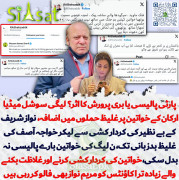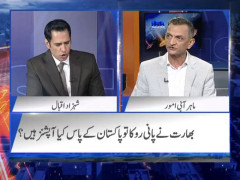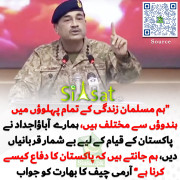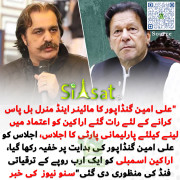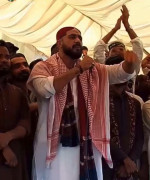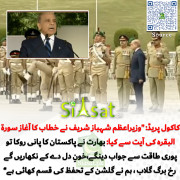Re: Pakistan fighter pilot wins battle of sexes, now she's ready for war
Islamic History and the Women You Never Hear About: Female Warriors
Posted on
August 21, 2011 by
Nahida
Muslim women participated fully in war during the early periods of Islam while the Prophet was alive. Some of them healed the wounded, some devised strategies, others were warriors, and othersstill
recited war poetry to inspire the troops, (their weapons were words!) and a vast majority attended to all of the above. These stories are hardly unique, but of course, they have been kept hidden from us by jealous men who have lost all sense of their own modesty as they police ours, and as they and steal the rightful power given to us by God.
One such woman was Umm Umara, whom our Prophet observed was a better fighter than any man. Her courage and mastery with weapons easily surpassed that of any of the male warriors. She continued to fight in battles throughout her life and even after the Prophets death, until she lost her hand. (Battle of Uqraba) Another was Umm Hakim, who at the Battle of Marj al-Saffar single-handedly dispatched seven Byzantine soldiers. Seven. On her own. As well entire battalions of warriors on the other side.
In praising the brave women who fought beside the Prophet in wars, let us not forget the cunning strategists by whose plans some of these battles were won.
Azdah bint al-Harith bin Kaldah, who saw that they had been left defenseless as the troops awaited the enemy by the river, turned to the women at the base and said, Our men are busy in combat with the enemy and I do not feel secure that the enemy might not turn back upon us, and we do not have anyone here to prevent them. And I also fear that the enemy may be too many for the Muslims and that they may defeat us.
So instead of waiting with the possibility of attack and devastation suspended in the air, she devised a scheme. With the headscarves that the women used, together they created a banner, and with Azdah in the lead, the women charged toward the approaching enemy calling out war poetry.
Mistaking the women for reinforcement troops (it is unknown whether these women actually carried weapons) because of the banner over them, the enemy quickly retreated in the middle of the battle, and were promptly pursued. This particular ground was won.
After the Prophets death, with the various wars over political power that followed, men returned to their earlier lifestyles of atrocious patriarchal practices, abandoning the respectful ethics that Islam had instilled in them. How is it, that with so many women contributing to society and arguing viciously with leaders and writing law and fighting beside men in wars, that we have now come to thissilence, seclusion, and violations of our rightful freedoms? Once our beloved Prophet passed, men strayed almost immediately from Islamic lifestyles as they consumed themselves in patriarchy, especially with warfare, and opposed jihad for women despite the precedent set by the Prophet. To discourage women from becoming warriors, men began to expose them in battle, ripping off their clothing and throwing them to the ground before killing them. We see repulsively sinful violations of Islamic war ethics today, even with comparatively smaller factors such as
timeliness, as Muslims are not allowed to wage war four months out of twelve in the Islamic calendar with the obvious exception of urgent self-defense. And even before then, long before then, men began to collect women and describe them as objects to be sampled very shortly after the death of the Prophet.
As easy as it is to become discouraged, we need only to look at our own history for inspiration and assurance (or as much of it as we can find what with men erasing and rewriting it) for our revivalism. Our Prophet was a feminist, as were the women who came before us, and feminism is jihadour struggleagainst corrupted, sexist men and their patriarchal projections on religious texts supposedly in the name of God. This is our personal struggle, and our struggle as a community, to retrieve with argument and education the egalitarian ways in which we were meant to live and the rights we deserve as Muslim women by the word of the Quran. And to ensure that our daughters are given the same freedoms as our sons, and that we can live peacefully both within ourselves and in beautiful coexistence with other faiths, and atheists.










